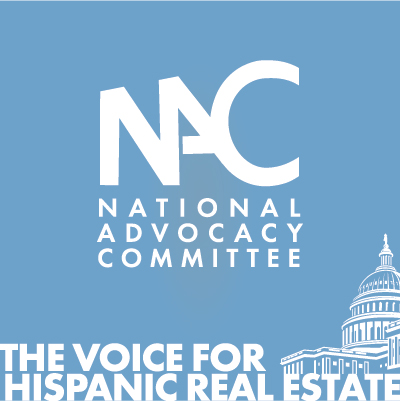Here’s your comeback. FAQ for NAHREP advocates
Celebrating NAHREP familia, cultura, politics, and grassroots action
June 2, 2022
Qué onda mi gente?!
It’s June! Can you believe that? We’re essentially halfway through 2022! I can’t even wrap my head around that. But, with any milestone, it’s important to do some reflections.
A couple of highlights from the first half of this year:
2021 State of Hispanic Homeownership Report: This March, we released our 11th edition of the State of Hispanic Homeownership Report where we not only featured artists, but we conducted the first-ever qualitative study, using our members to help us tell the story of Latino homeownership.
Government Affairs Director Program: We have ensured that every chapter has a Government Affairs Director (GAD) and that they are receiving adequate training, whether it be through boot camps at our national conferences or through one-on-one coaching from our National Advocacy Committee (NAC) Regionals.
NAC Delegation Calls: We established National Advocacy Committee (NAC) monthly regional delegation meetings where GADs and chapter leaders can meet with other chapters to discuss policies impacting their region.
Virtual Capitol Hill Visits: For the second year in a row, we conducted Virtual Capitol Hill Visits. This year, we met with over 50 offices and had more member meetings than ever before. Yes, I know going to meetings in person are a lot of fun, but the benefit of virtual meetings is that we had time to properly prep ahead of time!
City Council Campaign: With the understanding that all politics are local and that policies impacting housing inventory, such as zoning and permits, happen at the local level, we established a City Council Campaign where we’ve urged our chapters to show up to city council meetings and speak up about housing producton and housing. For more information, read through part 1 and part 2 of our “how-to” blogs on our city council campaign.
After all of this, we’ve had some time to reflect on the most common comebacks, questions, and comments we most often receive from elected officials (and their staff) when we advocate on behalf of NAHREP. So, next time you’re talking to your elected official and you get one of the following comments or questions, here are suggestions on how to respond.

NAHREP Advocacy Frequently Asked Questions
Common Response #1: It’s someone else’s fault
This is quite possibly the most common comeback we hear. If we’re talking to our Members of Congress or federal stakeholders, they often say: “Well, there’s not much we can do at the federal level. This is a local issue.” If we talk to our local city councils they say: “Well, we’re doing everything we can. But it has to be shared equally among cities.” Or, “Well materials are too expensive and labor is too scarce. Those are issues that need to be addressed at the federal level.”
Response: Today, we are short nearly 5 million homes relative to demand and that number keeps on growing. If we were to analyze the causes of these shortages, local governments, the federal government, and the private sector all have played a role. We have too big of a problem to wait for someone else to fix it. This is why the problem has reached such extreme levels, because this is the attitude all entities are taking. In reality, everyone needs to do their part. The only way we’re going to fix the housing supply crisis is if the federal government, state governments, local governments, AND the private sector all do everything in their power to ensure we build more homes.
Common Response #2: We are very supportive of affordable housing
We hear this a lot. Today, we have to be very careful with the term “affordable housing” because first of all, what is affordable in today’s market? The term affordable housing usually refers to rentals and subsidized housing-often not inclusive of homeownership. Also, remember, even if they are doing some work on building entry-level homes, the shortage is so dire that we always need more.
Response: We appreciate the work you have done on affordable housing and we need as many affordable housing champions out there as we can get. We want to urge you to include entry-level housing for owner-occupants, especially first-time homebuyers, in your affordable housing plans. We recognize that there is a housing shortage crisis across the board. However, no other product has seen more severe levels of underproduction than entry-level housing for first-time homebuyers. What are you doing to ensure that we are building more of this type of housing?
Common Response #3: We don’t build housing
This is a response we’ve heard from city councils who make it a point to say, they’re not the ones that are going to build the homes. Developers need to build homes.
Response: Yes, but you have so much control over zoning and permitting. The more density we create, the more access first-time homebuyers will have to homeownership opportunities where they work. Density requires zoning reform to allow multiple units per lot. Are there square footage requirements for certain areas that are prohibiting the building of smaller homes, such as condos and townhomes, for first-time homebuyers? Are there parking restrictions that prohibit the building of more units? How quickly are you processing and approving building permits? How difficult is it to obtain a building permit? What incentives are you providing developers to ensure that condos, townhomes, and small homes are being constructed for first-time homebuyers? These are all things to look at in our city and see where we can do more.
These are three of the most common things we’ve been hearing over and over again. I will sprinkle more FAQ responses in future blogs throughout the year with suggestions on comebacks and responses. Want to share something you’ve heard when you advocate on behalf of NAHREP’s policies? Send me a message!

About Noerena Limón
Noerena Limón is NAHREP’s Executive Vice President of Public Policy and Industry Relations. Noerena heads the organization’s policy and advocacy efforts on issues ranging from homeownership, housing inventory, credit access and immigration.
Prior to joining NAHREP, Noerena spent six years at the Consumer Financial Protection Bureau (CFPB) and served as a political appointee under President Obama in the White House Office of Political Affairs.



